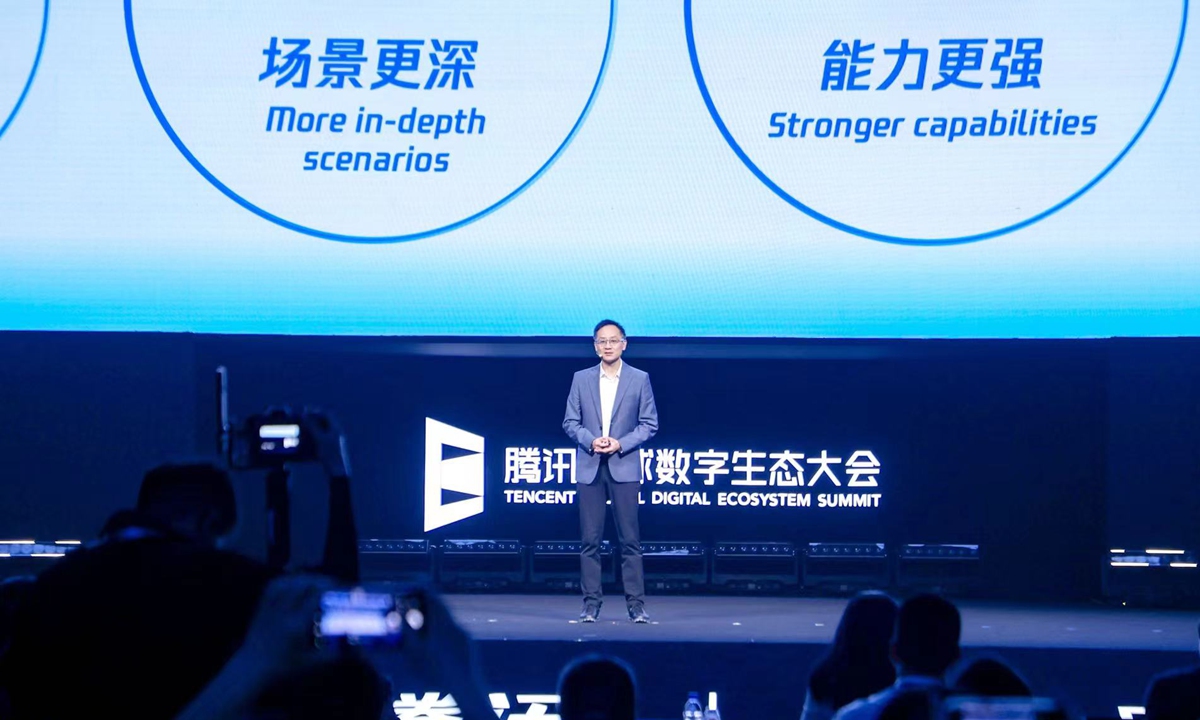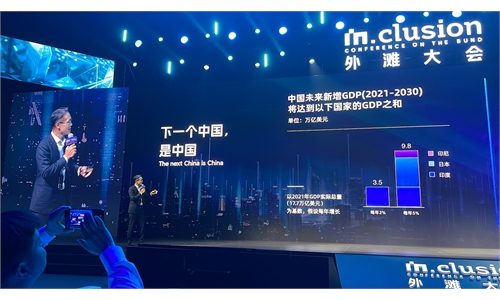
Tencent debuts its AI large language model Hunyuan at its Global Digital Ecosystem Summit on Thursday. Photo: Courtesy of Tencent
China's tech giant Tencent debuted its long-awaited artificial intelligence (AI) large language model (LLM) on Thursday, joining other Chinese tech firms which have rolled out their own models amid the global frenzy for generative AI, ignited by the popular ChatGPT developed by US firm OpenAI earlier this year.
Referred to as the technology that is used to train AI chatbots, LLMs has been a focal point for tech giants and emerging start-ups in both China and the US, the world's two leading forces in AI innovation.
Unveiled at Tencent's flagship Global Digital Ecosystem Summit, the LLM, named Hunyuan, is a general-purpose model featuring strong Chinese language processing abilities, advanced logical reasoning, and comes with reliable task execution power, according to a statement that the firm sent to the Global Times on Thursday.
It supports a wide range of functions spanning the creation of images, copywriting, text recognition and customer service.
The newly-launched LLM has been connected to 50 of Tencent's own products including Tencent Cloud and Tencent Meeting.
Enterprises in China now have access to Hunyuan via Tencent's public cloud platform, but for individual users, no timetable has been given, the Global Times learnt.
Tencent's move followed an array of domestic tech firms that are doubling down on LLM efforts. Chinese search engine giant Baidu was the first big tech firm to debut an AI product to rival ChatGPT when it unveiled its language AI Ernie Bot in March. In the following month, Alibaba launched its LLM called Tongyi Qianwen, which allows AI content generation in both English and Chinese.
Last week, Baidu opened its chatbot Ernie Bot to the public after receiving approval from Chinese regulators.
Ant Group will reveal the latest progress of self-developed LLM on Friday, Eric Jing, Chairman and CEO of Ant Group said at an event on Thursday.
"Different from other firms that took the lead in rolling out general-purpose LLM, Tencent's first move in the LLM turned out to be in the enterprise-level LLM, as it believed that by empowering enterprises in vertical industries, it could better reflect LLM's value," Liu Dingding, a Beijing-based veteran tech analyst, told the Global Times on Thursday.
While Chinese players are doubling down on LLMs, US firms on the other side of the Pacific are accelerating investment as part of the global race for AI supremacy.
OpenAI will host its first-ever developer conference on November 6 in San Francisco, the company announced.
Any updates about GPT-5, the presumed name of OpenAI's next flagship LLM, is unlikely during the event, as CEO Sam Altman squashed rumors that the firm is working on GPT-5.
China and the US are the two major forces in the world in the generative AI sector, accounting for more than 80 percent of the world's LLMs. The US as the first mover is currently leading the race, while China is rapidly catching up, Liu said.
More than 70 LLMs with over one billion parameters have been released in China so far, Baidu CEO Robin Li told an industry event on Tuesday.
"China has apparent advantages in core application scenarios, key for the landing of any cutting-edge technologies," Liu said, adding that Chinese firms should ramp up efforts in improving computing power, algorithms and data quality.
"It is only a matter of time that the chatbot products released by domestic firms find themselves shoulder-to-shoulder with ChatGPT," Liu said, predicting the timeframe would be within the year.
Both Chinese regulators and tech giants have attached great importance on generative AI development, viewing it as a strategic priority.
In August, China's temporary rules for managing generative AI services took effect, a move that is believed to promote the sound development of AI sector while safeguarding national security and the public interest.


